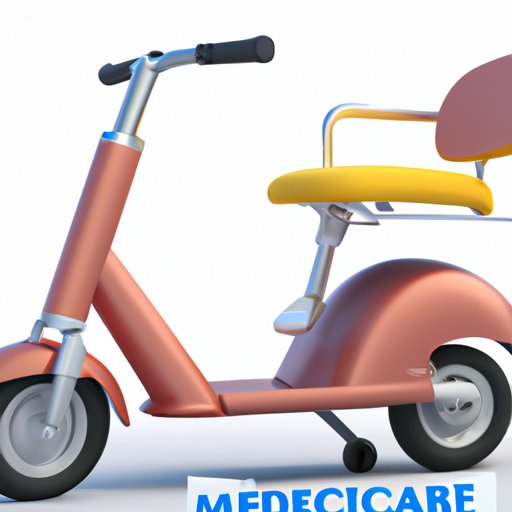Introduction
For many Medicare beneficiaries, a motorized scooter can be a valuable tool for maintaining independence and mobility. However, navigating the world of Medicare coverage can be confusing, and it can be difficult to determine whether a motorized scooter will be covered. In this article, we’ll explore the ins and outs of Medicare coverage for motorized scooters, including the benefits, limitations, and requirements that beneficiaries should keep in mind.
Rev Up Your Independence: How Medicare Can Help You With a Motorized Scooter
For those who struggle with mobility issues, a motorized scooter can be a game-changer. Unlike traditional wheelchairs or walkers, motorized scooters allow users to move around more easily and complete daily tasks with greater independence. The good news for Medicare beneficiaries is that these scooters can be covered under Medicare Part B, as long as certain requirements are met.
If your doctor determines that a motorized scooter is medically necessary, Medicare may cover up to 80% of the cost of the scooter. This is considered durable medical equipment (DME) and falls under Part B coverage. However, it’s important to keep in mind that the remaining 20% coinsurance may still be a significant expense for some beneficiaries.
Navigating the Fine Print: Understanding Medicare’s Motorized Scooter Coverage
Before you rush out to purchase a motorized scooter, it’s important to have a clear understanding of Medicare’s coverage rules and requirements. To be covered by Medicare, the scooter must be deemed medically necessary by your doctor, and it must be purchased or rented from a Medicare-approved supplier. You’ll also need a doctor’s prescription and a detailed written order from your supplier to ensure that your scooter is covered.
Additionally, there are certain limitations to Medicare coverage that beneficiaries should be aware of. Medicare will only cover the cost of a scooter that is used primarily within your home and/or required for certain medical conditions or injuries. Scooters that are used primarily for leisure or recreation are not eligible for coverage.
A Closer Look at the Benefits of Motorized Scooters for Medicare Users
While the requirements for Medicare coverage may seem restrictive, the benefits of a motorized scooter for Medicare beneficiaries are clear. According to the Centers for Disease Control and Prevention (CDC), mobility devices like motorized scooters can help users maintain independence, reduce the risk of falls, and improve overall quality of life. In addition, using a scooter can make daily tasks like grocery shopping or running errands much easier and less exhausting.
Many Medicare beneficiaries have already experienced these benefits firsthand. In a survey conducted by the National Council on Aging, nearly three-quarters of respondents who used a mobility device reported that it improved their ability to participate in daily activities, and more than half said that it reduced their risk of falling.
Breaking Down the Cost: Is a Motorized Scooter Worthwhile Under Medicare?
While a motorized scooter can be a significant investment, the cost may be worth it for beneficiaries who value independence and mobility. In addition to the potential cost savings from Medicare coverage, a scooter can also be a more practical and convenient option than other mobility aids like walkers or manual wheelchairs.
Of course, it’s important to consider the full cost-benefit analysis before committing to a motorized scooter. Beneficiaries should factor in the ongoing cost of maintenance, repairs, and accessories, as well as the potential resale value if the scooter is no longer needed.
Maximizing Your Benefits: How to Get the Most Out of Medicare’s Motorized Scooter Coverage
To ensure that you’re getting the most out of your Medicare benefits, it’s important to understand all of your options for coverage and assistance. There are a number of resources available to help beneficiaries navigate the Medicare system and make informed decisions about their healthcare.
One valuable resource is the Medicare Savings Programs, which provide financial assistance to help cover the cost of Medicare premiums, deductibles, and coinsurance. Additionally, Medicare Advantage plans may offer additional coverage for motorized scooters and other DME, depending on your specific plan.
Finally, be sure to work with a Medicare-approved supplier who can help guide you through the process of obtaining a motorized scooter and ensuring that it is covered by Medicare.
Conclusion
For many Medicare beneficiaries, a motorized scooter can be a transformative tool that allows for greater independence and mobility. While navigating the world of Medicare coverage can be complex, understanding the rules and requirements can help ensure that you’re able to access the benefits you need. By working with a Medicare-approved supplier and taking advantage of available resources, you can make the most out of your coverage and enjoy the many advantages of a motorized scooter.
(Note: Is this article not meeting your expectations? Do you have knowledge or insights to share? Unlock new opportunities and expand your reach by joining our authors team. Click Registration to join us and share your expertise with our readers.)
